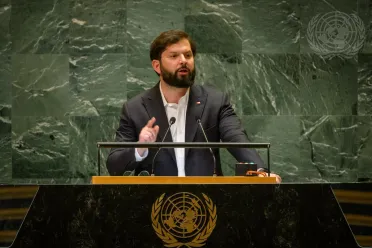Statement
Statement summary
GABRIEL BORIC FONT, President of Chile, noting that 2025 will mark 80 years since 51 countries “took the momentous step of creating the UN”, observed that “the world has changed a great deal” since 1945. Yet, some things remain the same. Pointing to statements made earlier today in support of Security Council reform, he asked: “Is anybody in this Assembly opposed to this?” He therefore proposed that a deadline be set for such reform so that, when the UN celebrates its eightieth birthday, it can do so with a Council that “includes Brazil, India and at least one country from Africa, among others”. Human institutions depend on the will of their leaders — “us”, he emphasized — and those unable to adapt to their era risk failure. In that context, he said that it is “worth remembering the swift collapse of the League of Nations” and added: “There are times when change is the best way of ensuring the continuity of our history — and this is exactly one of those.”
He went on to say that the international community is sometimes accused of double-standards in the face of human-rights violations around the world: “We condemn what our adversaries do, but when an alleged friend is the one violating the UN Charter, we look aside or express ambiguity.” Yet, the Palestinian teenager murdered in Gaza, the Venezuelan workers forced from their homeland, the Ukrainian child abducted by the Russian Federation, the silenced opposition in Nicaragua and the women expelled from school in Afghanistan “are all, above all, human beings”, he said, underscoring that “the voice of all nations should be raised in their defence”. He added: “For this reason, I refuse to choose between the terror of Hamas or the genocide carried out by Netanyahu’s Israel; we have no reason to choose between barbarities — I choose humanity.” Further, the Russian Federation’s aggression against Ukraine must cease, and the UN is the right body to end this flagrant transgression of international law.
Also reaffirming Chile’s commitment to democracy — “the only system capable of maintaining peace, reaching sustainable development and protecting dignity, rights and fundamental freedoms” — he expressed concern over peoples’ increasing disaffection with this form of Government and over the emergence of authoritarian leaders “who persecute or insult those with ideas different to their own”. In Venezuela, “we have a dictatorship that is trying to steal an election, which persecutes its opposition and is indifferent to the exile of millions of its citizens”, he said. A political outcome that recognizes the opposition’s triumph in the latest elections and undertakes a peaceful transition towards democracy is required, he stressed, adding that unilateral sanctions imposed by the United States worsen the conflict because such measures affect vulnerable people more than they do dictators. “Chile is not in a position to receive more Venezuelan migrants,” he underscored, noting the 800,000 his country currently hosts.
Turning to artificial intelligence, he said that Chile is committed to its ethical, transparent and responsible regulation. As that technology “reproduces prejudices and stereotypes” due to the biases existent in the databases it uses, he stressed that history teaches that trusting large companies to regulate themselves does not work. If the international community does not act now by demanding traceability in algorithms, data audits and corrective human intervention, “we might, in a few years, see a new form of extermination — digital extermination of non-hegemonic cultures”, he warned. Also urging that science not be denied in the face of increasingly frequent droughts, floods and fires, he said that, while humanity faces many challenges, “our fate is not set in stone”. Paraphrasing a warning written by Chilean poet Elvira Hernández — “we are migratory birds, but we have become used to behaving as monuments” — he urged that the UN not become a sterile, static monument but, rather, that “this great historic achievement” become a “renewed bright light for 2024”.
Full statement
Read the full statement, in PDF format.
Photo

Previous sessions
Access the statements from previous sessions.
